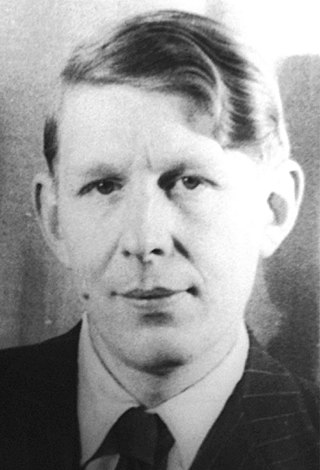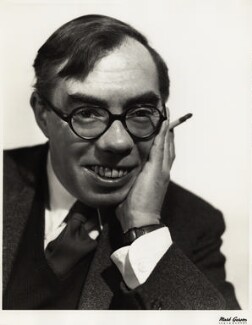Related Research Articles

Wystan Hugh Auden was a British-American poet. Auden's poetry was noted for its stylistic and technical achievement, its engagement with politics, morals, love, and religion, and its variety in tone, form, and content. Some of his best known poems are about love, such as "Funeral Blues"; on political and social themes, such as "September 1, 1939" and "The Shield of Achilles"; on cultural and psychological themes, such as The Age of Anxiety; and on religious themes such as "For the Time Being" and "Horae Canonicae".

Christopher William Bradshaw Isherwood was an Anglo-American novelist, playwright, screenwriter, autobiographer, and diarist. His best-known works include Goodbye to Berlin (1939), a semi-autobiographical novel which inspired the musical Cabaret; A Single Man (1964), adapted as a film by Tom Ford in 2009; and Christopher and His Kind (1976), a memoir which "carried him into the heart of the Gay Liberation movement".
Henry Reed was a British poet, translator, radio dramatist, and journalist.
Faber and Faber Limited, usually abbreviated to Faber, is an independent publishing house in London. Published authors and poets include T. S. Eliot, W. H. Auden, Margaret Storey, William Golding, Samuel Beckett, Philip Larkin, Ted Hughes, Seamus Heaney, Paul Muldoon, Milan Kundera and Kazuo Ishiguro.

Rudolf John Frederick Lehmann was an English poet and man of letters. He founded the periodicals New Writing and The London Magazine, and the publishing house of John Lehmann Limited.

Frederick Louis MacNeice was an Irish poet and playwright, and a member of the Auden Group, which also included W. H. Auden, Stephen Spender and Cecil Day-Lewis. MacNeice's body of work was widely appreciated by the public during his lifetime, due in part to his relaxed but socially and emotionally aware style. Never as overtly or simplistically political as some of his contemporaries, he expressed a humane opposition to totalitarianism as well as an acute awareness of his roots.
The Penguin poetry anthologies, published by Penguin Books, have at times played the role of a "third force" in British poetry, less literary than those from Faber and Faber, and less academic than those from Oxford University Press..

Walter Ernest Allen was an English literary critic and novelist and one of the Birmingham Group of authors. He is best known for his classic study The English Novel: a Short Critical History (1951).

Eric Robertson Dodds was an Irish classical scholar. He was Regius Professor of Greek at the University of Oxford from 1936 to 1960.
The Auden Group or the Auden Generation is a group of British and Irish writers active in the 1930s that included W. H. Auden, Louis MacNeice, Cecil Day-Lewis, Stephen Spender, Christopher Isherwood, and sometimes Edward Upward and Rex Warner. They were sometimes called simply the Thirties poets.
The Ariel Poems were two series of pamphlets that contained illustrated poems published by Faber and Gwyer and later by Faber and Faber. The first series had 38 titles published between 1927 and 1931. The second series, published in 1954, had 8 titles.
The Group Theatre (London) was an experimental theatre company founded in 1932 by Rupert Doone and Robert Medley. It evolved from a play-reading group in Cambridge that Doone had been involved with during his years studying with the Cambridge Festival Theatre. The Group Theatre was active from 1932 to 1939 and reformed as The Group Theatre Ltd. in the early 1950s.

Sir Stephen Harold Spender was an English poet, novelist and essayist whose work concentrated on themes of social injustice and the class struggle. He was appointed Poet Laureate Consultant in Poetry by the United States Library of Congress in 1965.

John Frederick Norman Hampson Simpson was an English novelist writing as John Hampson. Best known for his 1931 novel Saturday Night at the Greyhound – an unexpected success for Hogarth Press – he was a member of a Birmingham Group of working-class authors that included Walter Allen, Leslie Halward, Walter Brierley and Peter Chamberlain.
Janet Buchanan Adam Smith OBE was a writer, editor, literary journalist and champion of Scottish literature. She was active from the 1930s through to the end of the century and noted for her elegant prose, her penetrating judgement, her independence of mind – and her deep love of mountains and mountaineering.

The literary tradition of Birmingham originally grew out of the culture of religious puritanism that developed in the town in the 16th and 17th centuries. Birmingham's location away from established centres of power, its dynamic merchant-based economy and its weak aristocracy gave it a reputation as a place where loyalty to the established power structures of church and feudal state were weak, and saw it emerge as a haven for free-thinkers and radicals, encouraging the birth of a vibrant culture of writing, printing and publishing.

"Carrickfergus" is a 44-line poem by Louis MacNeice. It was written in 1937 and first published in book form in MacNeice's poetry collection The Earth Compels (1938). The poem reflects on MacNeice's childhood in Carrickfergus, a large town in County Antrim, Northern Ireland. Although the title of the poem is "Carrickfergus", the text of the poem refers to "Carrick", as the town is known locally and colloquially.

Highfield was a large house situated at 128 Selly Park Road in the Selly Park area of Birmingham, England. Built in the 1860s, it was bought in 1929 by Philip Sargant Florence and his wife Lella Secor Florence after Sargant Florence was appointed as a professor at the nearby University of Birmingham.
Walter Brierley (1900–1972) was an English novelist active in the 1930s and one of the Birmingham Group of writers. His first book Means Test Man has been called “one of the most powerful and original novels of that decade.”
References
- ↑ Nicholls, Tony (6 March 1999). "Obituaries: Professor Ronald Willetts". The Independent. Independent News and Media Limited. Retrieved 1 January 2009.
It is difficult at this distance to appreciate the artistic and intellectual ferment of the Faculty of Arts at Birmingham in the 1930s. Louis MacNeice, Henry Reed, W.H. Auden, Walter Allen and the other members of the "Birmingham Group" were around and very active
- ↑ "As I Was Walking Down Bristol Street". Media Archive for Central England. University of Leicester. Retrieved 1 January 2009.[ permanent dead link ]
- ↑ Baldick, Chris (2002). "The Modern Novel as Social Chronicle". The Modern Movement (1910-1940). The Oxford English Literary History. Oxford University Press. p. 184. ISBN 0-19-818310-0.
- ↑ Hawtree, Christopher (2 March 1995). "Obituary: Walter Allen". The Independent. Newspaper Publishing Plc. p. 18.
- ↑ Feigel, Lara (2007). "Buggery and Montage: Birmingham and Bloomsbury in the 1930s". In Burrells, Anna; Ellis, Steve; Parsons, Deborah; Simpson, Kathryn (eds.). Woolfian Boundaries. Clemson, SC: Clemson University Digital Press. pp. 51–57. Retrieved 23 March 2015.
- ↑ MacNeice, Louis (1965). The Strings are False: An Unfinished Autobiography . London: Faber and Faber (published 1996). p. 154. ISBN 0571118321.